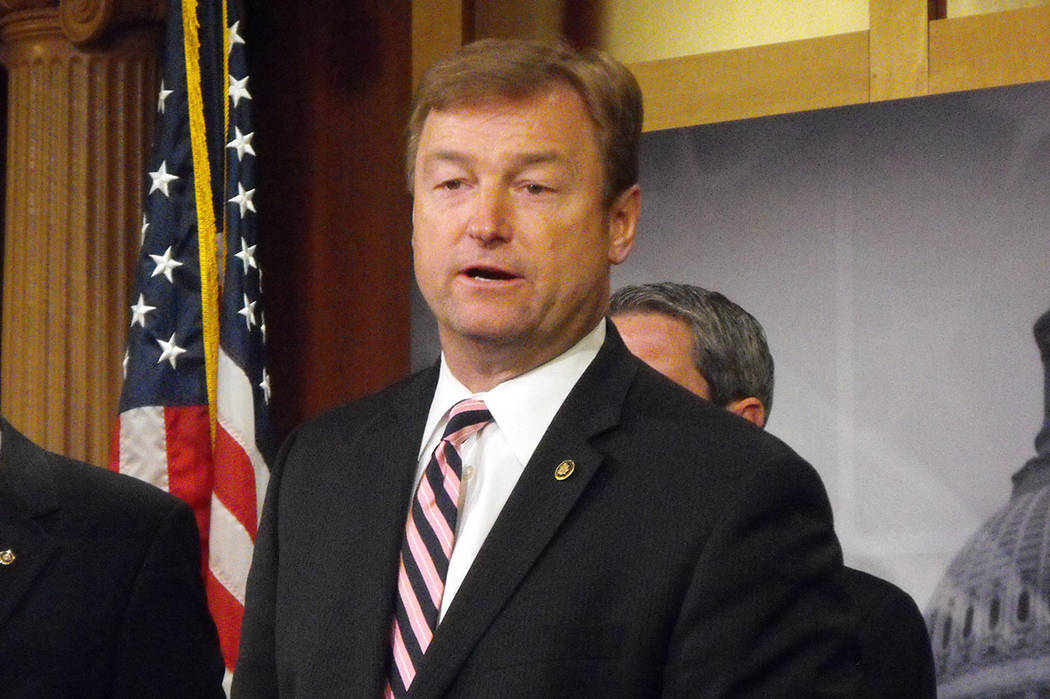Experts: Obamacare repeal could leave rural Nevada in peril
As Senate Republicans continue their efforts to repeal Obamacare, Nevada officials are worried that the move could be devastating for rural Nevada counties, including Nye.
John Packham, director of health policy research at the Office of Statewide Initiatives at the University of Nevada, Reno School of Medicine said the expansion of Medicaid Obamacare helped to reduce the number of uninsured people across the state including rural counties such as Nye.
About 4,000 people gained Medicaid in Nye County from 2011 through 2016, according to the Nevada Rural and Frontier Health Data Book.
“You guys cut your uninsured population by a third in six years,” Packham said.
Between 2011 and 2016, Nevada Medicaid enrollment has increased by almost 74 percent including enrollment growth of 52 percent in rural and frontier counties, the data showed.
Nye County, which has a large population of retirees, is especially vulnerable in this situation. Officials said the proposed repeal is concerning from the standpoint of those who are insured under Obamacare but also from the standpoint of health care providers.
The report also said that between 2008 and 2014, the number of uninsured Nevadans under the age of 65 decreased by 21.3 percent, and among rural and frontier counties, the number decreased by 32.3 percent.
In addition, there was 10 percent of uninsured Nevadans under the age of 19 in 2014, including 11.3 percent of uninsured rural and frontier children, the report said.
Heller says no
The question about the future of the Better Care Reconciliation Act remains open after Senate Republican leaders postponed the vote on the bill.
Mitch McConnell, R-Kentucky, Senate Majority leader, announced the delay on the Obamacare repeal on Tuesday after Republicans failed to gain enough votes to move the legislation forward.
“Consequently, we will not be on the bill this week, but we are still working toward getting at least 50 people in a comfortable place,” McConnell said ahead of the meeting with President Donald Trump that took place in White House.
A group of five key Republican senators, including Nevada’s Dean Heller, have been against the key provisions of the bill that could affect populations in their state.
Nevada Gov. Brian Sandoval was vehement in his opposition of the bill.
On June 23, Sandoval was flanked by Heller at a news conference in Las Vegas where Heller announced that he will not vote for the proposed bill in its current form.
“This bill that’s currently in front of the United States Senate is not the answer. It’s simply not the answer,” Heller said about the Republican attempt to repeal Obamacare.
Heller’s announcement was met with sharp criticism from Trump’s supporters. America First Policies, a pro-Trump group started running critical TV advertisements against Heller in Nevada before they were pulled abruptly.
The vote on Obamacare repeal is expected to take place after the July 4 recess.
No Democrats currently support the measure. Senate Republicans need to get at least 50 votes for the bill to pass.
State insurers worried
Several provisions in the proposed Better Care Reconciliation Act are also expected to impact Nevada Exchange, the Nevada marketplace through which consumers can buy health insurance.
Among them are the changes to eligibility for Advanced Premium Tax Credits, adjusted age rating for older consumers, modifications to the individual mandate, and the eventual elimination of cost-sharing reductions.
Janel Davis, communications officer at Silver State Health Insurance Exchange, said all of those provisions could have implications for the 89,061 Nevadans who access Qualified Health Plans through the exchange.
“Any combination of these changes, if adopted, would have a significant impact on accessibility and affordability for Nevada’s consumers,” Davis said.
The Better Care Reconciliation Act would provide subsidy assistance for persons below 100 percent federal poverty level which would open up insurance options on the exchange for those states that did not expand Medicaid, and for individuals who would roll off of Medicaid as federal support is lowered in future years.
Under the Affordable Care Act, subsidies are tied to silver level plans with actuarial values of 66 to 72 percent, wherein the carrier pays an average of 70 percent of the expenses and the consumer pays the additional 30 percent.
The Better Care Reconciliation Act ties subsidy to higher deductible benchmark bronze level plans with a 58-percent actuarial value, thus exchange consumers would receive less subsidy assistance and pay more in out-of-pocket medical expenses, Davis said.
Larry Levitt, senior vice president with the non-partisan Kaiser Family Foundation, estimates the changes represent a 15-percent reduction in subsidy assistance for those who qualify. It is likely that the combination of the higher income threshold and the lower actuarial value benchmark plan will result in large increases in out-of-pocket costs for Nevadans.
In addition, the bill would reduce income limits for individuals accessing subsidies through the exchange.
“It changes the income cutoff from 400 percent federal poverty level to 350 percent federal poverty level,” Davis said.
The exchange estimates that 3,500-4,000 Nevadans will lose access to subsidy assistance as a result of income limit changes.
Congressional Budget Office report
The Congressional Budget Office and the Joined Committee on Taxation Report showed that although the Better Care Reconciliation Act would reduce the federal deficit by $321 billion over the next decade, it will increase the number of uninsured people by 22 million relative to the number under current law.
An estimated 49 million people would be uninsured by 2026, compared with 28 million who would lack insurance in the same year under current law, according to the report.
The number of uninsured people has been dropping nationwide thanks to Obamacare, a trend that Packham said would be completely reversed under the proposed bill.
“What everyone is concerned about, particularly the Congressional Budget Office is we are basically going back in the pre-Obamacare time in terms of uninsured people,” Packham said.
The report also estimated that in 2018, 15 million more people would be uninsured under the Republican-backed legislation than under current law because the penalty for not having insurance would be eliminated.
“It’s going to affect all parts of the state,” Packham said. “Nevada has done a good job reducing not just the number of uninsured adults, but also the number of kids without insurance.”
Contact reporter Daria Sokolova at dsokolova@pvtimes.com. On Twitter: @dariasokolova77

















